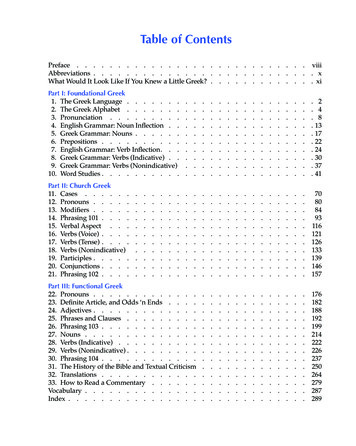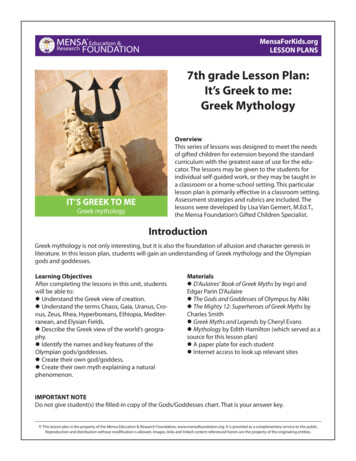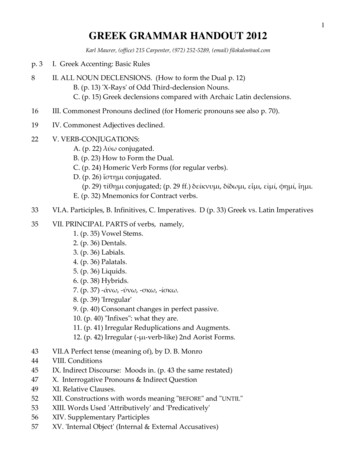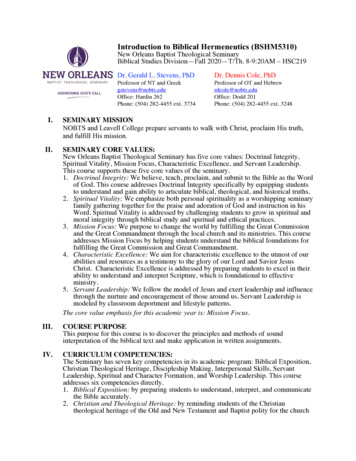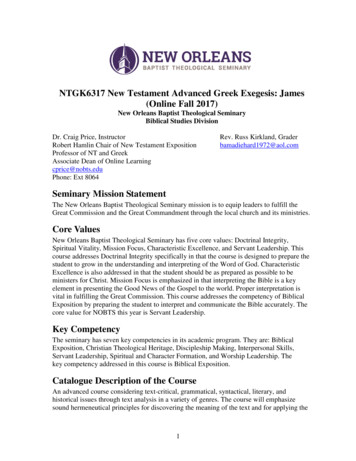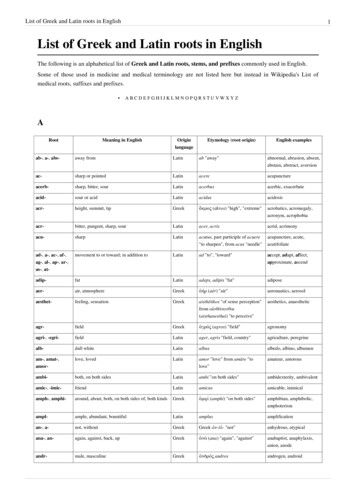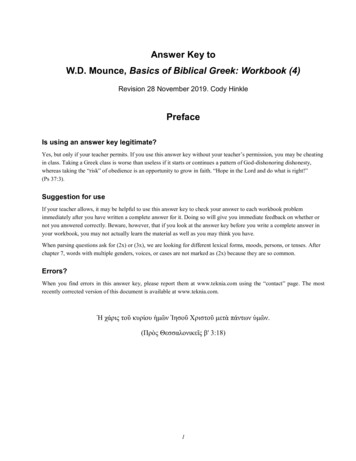
Transcription
Answer Key toW.D. Mounce, Basics of Biblical Greek: Workbook (4)Revision 28 November 2019. Cody HinklePrefaceIs using an answer key legitimate?Yes, but only if your teacher permits. If you use this answer key without your teacher’s permission, you may be cheatingin class. Taking a Greek class is worse than useless if it starts or continues a pattern of God-dishonoring dishonesty,whereas taking the “risk” of obedience is an opportunity to grow in faith. “Hope in the Lord and do what is right!”(Ps 37:3).Suggestion for useIf your teacher allows, it may be helpful to use this answer key to check your answer to each workbook problemimmediately after you have written a complete answer for it. Doing so will give you immediate feedback on whether ornot you answered correctly. Beware, however, that if you look at the answer key before you write a complete answer inyour workbook, you may not actually learn the material as well as you may think you have.When parsing questions ask for (2x) or (3x), we are looking for different lexical forms, moods, persons, or tenses. Afterchapter 7, words with multiple genders, voices, or cases are not marked as (2x) because they are so common.Errors?When you find errors in this answer key, please report them at www.teknia.com using the “contact” page. The mostrecently corrected version of this document is available at www.teknia.com.Ἡ χάρις τοῦ κυρίου ἡμῶν Ἰησοῦ Χριστοῦ μετὰ πάντων ὑμῶν.(Πρὸς Θεσσαλονικεῖς βʹ 3:18)1
2Review #1Exercise 3The Alphabet and PunctuationGrammar1.2.3.What are the seven vowels?NameLower CaseUpper UpsilonυΥOmegaωΩWhen do you find the two different forms of sigma?a.The “final sigma” form ( ς ) is written wherever lower-case sigma is the last letter of a word.b.The normal lower-case form ( σ ) is written wherever lower-case sigma is not the last letter of a word.What are the two breathing marks, and when do you find them?a.The rough breathing mark ( ἁ ) sounds like the English letter “h.”b.The smooth breathing mark ( ἀ ) does not affect pronunciation. If the first letter of a word is a vowel or the letter rho ( ρ ), the word has a breathing mark. If the first letter of a word is not a vowel or the letter rho ( ρ ), the word does not have a breathing mark. If the first letter of a word is upsilon ( υ ) or rho ( ρ ), the breathing mark is always a rough breathing mark.Otherwise, either a rough breathing mark or a smooth breathing mark could be used, depending upon the word. The breathing mark is placed as follows: If the word begins with a diphthong, then the breathing mark goes over the second vowel of the diphthong(e.g., αἰών and Αἰών). Otherwise, the breathing mark goes over the first letter of the word (e.g., ῥαββί, ὑπέρ, ὡς, and ἀμήν). Exception: If the first letter is a capital letter (and not part of a diphthong), the breathing mark goes infront of the capital letter instead of over it, because there is no room over the capital letter to put abreathing mark. (e.g., Ῥωμαῖος, Ἠλίας, and Ἱόππη).
Exercise 34.How does the iota subscript affect pronunciation? 5.The iota subscript does not affect pronunciation. 1When is the diaeresis used? 13The diaeresis ( ) is used over the second of two vowels in a row that normally form a diphthong, but should bepronounced separately in this particular word. For example, in English, “Noel” as a man’s name has one syllableand rhymes with “mole” because “oe” forms a diphthong in English. “Noël” as a woman’s name, however, hastwo syllables and is pronounced as “no el” because the diaeresis over the “e” indicates that “oe” does not form adiphthong in this word.Advanced information: Some teachers instruct students to pronounce alpha differently depending on whether it is shortor long. Since iota only subscripts under long vowels, if alpha has an iota subscript, then you know that it is a longalpha, and should be pronounced accordingly. Where there is no iota subscript, however, you need some otherinformation to know whether the alpha is long or short, and hence how to pronounce it. So the iota subscript does notaffect the pronunciation of alpha, but it tells you which pronunciation to use. Because of the difficulty in knowingwhether an alpha is long or short, some teachers have students pronounce alpha the same regardless of whether it islong or short.
Exercise 4Punctuation and SyllabificationSyllabification1.ἀ μήν2.γρα φή3.ἔ σχα τος4.καρ δί α5.πνεῦ μα6.προ φή της7.σάβ βα τον8.ἄγ γε λος9.ἄν θρω πος10. πε ρι πα τέ ω4
Chapters 1 - 4Review #1Definitions1.What is a gamma nasal, and how is it pronounced? A gamma nasal is the letter gamma ( γ ) when followed by gamma ( γ ), kappa ( κ ), xi ( ξ ), or chi ( χ ). A gamma nasal is pronounced like the English letter “n.” 2.2In other words, it is the first letter of the consonant clusters γγ, γκ, γξ, or γχ.Therefore, the consonant clusters with a gamma nasal are pronounced as follows: γγ as “ng,” γκ as “nk,”γξ as “nks,” and γχ as “nch.”What is a diphthong? A diphthong is two vowels in a row that are pronounced together as one sound in one syllable rather thanseparately as two sounds in two syllables. The diphthongs that appear in the New Testament are as follows: 2Lower CaseUpper eudAdvanced information: There is one other Greek diphthong, ωυ, which doesn’t occur as a diphthong in the NT(although ωϋ occurs in the NT and the diphthong does appear in the LXX). ωυ is pronounced as a diphthong bycombining the two separate sounds into one quick, smooth sound ōh'-oo (Herbert Weir Smyth, Greek Grammar, rev.Gordon M. Messing [Harvard, 1984], 13).5
6Review #13.4.What is an improper diphthong? An improper diphthong is an alpha, eta, or omega with an iota subscript. 3 An improper diphthong is transliterated as if the iota subscript were a normal iota. An improper diphthong is pronounced as if the iota subscript did not exist.4Lower beyῳōitoneDescribe when an apostrophe is used. An apostrophe ( ʼ ) is used in the process of elision. In elision, certain words that end in a vowel substitute anapostrophe for the final vowel when followed by a word that begins with a vowel. Note that an apostrophe, asmooth breathing mark, and a coronis (used in the process of crasis, described on pages 111 and 338 of thetextbook) all look identical.Exercises5.6.7.34Write out the alphabet. Lower case: α β γ δ ε ζ η θ ι κ λ μ ν ξ ο π ρ σ/ς τ υ φ χ ψ ω Upper case: Α Β Γ Δ Ε Ζ Η Θ Ι Κ Λ Μ Ν Ξ Ο Π Ρ Σ Τ Υ Φ Χ Ψ Ω Names: alpha, beta, gamma, delta, epsilon, zeta, eta, theta, iota, kappa, lambda, mu, nu, xi, omicron, pi, rho,sigma, tau, upsilon, phi, chi, psi, omega.How are the two sigmas used in one word? Lower-case sigma is written ( ς ) when it is the last letter of a word, and is written ( σ ) everywhere else. E.g., ἀπόστολος.Give an example of a smooth breathing mark and a rough breathing mark. ἀμήν has a smooth breathing mark. ἁμαρτία has a rough breathing mark.Advanced information: When written in capital letters, the iota of an improper diphthong is written as a normal capitaliota (Smyth, 9). As a result, ᾳ and αι are both written in Greek capital letters as ΑΙ, and can only be distinguished bycontext.Advanced information: In the combination alpha-iota, if the alpha is short, the iota will not subscript, forming thediphthong αι. And if the alpha is long, the iota will subscript, forming the improper diphthong ᾳ. So if you pronounceshort and long alpha differently, pronounce the improper diphthong ᾳ as you pronounce a long alpha.
Review #18.Punctuation Marks. Match the Greek punctuation mark with its function.a.b.c.d.9.7,. (dot above the line);semi-colonquestion markcommaperiodAccents. Match the appropriate accent marks with their proper name.a. circumflexb. ˋacutec. grave510. How does an accent affect a translation? For most words, accent does not affect translation in any way. There are a few words that can only be distinguished by their accents. For a list, see page 338 in the textbook. Certain personal pronoun forms may have more emphasis if they are accented than if they are not. This isdescribed on pages 91 and 92 in the textbook.11. Syllabification. Divide the following words into syllables.5α.δι δά σκωνβ.δι α μαρ τυ ρό με νοςγ.ἄν θρω ποςδ.λέ γον τεςε.βάλ λωThe word “grave,” when it refers to the accent, can either be pronounced the same as when it refers to a tomb, or it canbe pronounced with the sound of the letter “a” in the word “part.”
Exercise 6Nominative and Accusative; Definite ArticleParsing A bullet ( ) separates the word’s stem from its case ending. A dash ( – ) indicates the absence of a case ending. Although we list multiple possible inflected meanings for some words, you need only list one unless your teacherinstructs otherwise.InflectedCaseNumberGenderἄνθρωπο νAccusativeSingularMasculine ἄνθρωποςman, mankind, person, humankind,human beingὧρα ιNominativePluralFeminineὥραhours, occasions, momentsτή νAccusativeSingularFeminineὁtheβασιλεία θεο ίNominativePluralMasculine θεόςgodsτό – (2x)Nominative orAccusativeSingularNeutertheλόγο υςAccusativePluralMasculine λόγοςwordsκαιρο ίNominativePluralMasculine καιρός(appointed) times, seasonsτά ςAccusativePluralFemininetheΧριστό νAccusativeSingularMasculine ΧριστόςWarm-upα.The hour comes.β.And they love God.γ.He saved others.δ.Now I see Jesus and the apostles.ε.Love is patient.ζ.I know that the work is finished.η.The Word made the world.8Lexical Form Inflected MeaningὁὁChrist, Messiah, Anointed One
Exercise 6Translation1.I send the messenger.2.They will see God.3.He was teaching them.4.Pursue love.5.You search the Scriptures.6.The time has come and the kingdom has drawn near.7.Christ finished the words.8.The Sabbath was made for humankind, and not humankind for the Sabbath.9.And he sent them to preach the kingdom of God.10. And now your kingdom will not continue.Additional11. But Paul said,6 “I sent other apostles.”12. The people believe Christ because they know his love.13. And Lamech said the words.14. And the words pleased Pilate.15. You will keep the Sabbaths.16. They believe the works of God.17. God made him Lord and Christ.18. The light came into the world, and the people loved the darkness more than the light.19. And they judged the people every hour.20. And they lifted up their voices.6You can translate with an English comma and quotation mark ( , “ ) any Greek semicolon ( ) that introduces a directquotation.9
Exercise 7Genitive and DativeParsing A bullet ( ) separates the word’s stem from its case ending. Ignore the “stem” for the article. Just notice that the article uses the normal case endings. A dash ( – ) indicates the absence of a case ending. After this chapter, we will not put (2x) by parsings that have multiple genders or cases.InflectedCaseNumberGenderLexical FormInflected Meaningἀγάπη ͺDativeSingularFeminineἀγάπηto a loveκυρίο ιςDativePluralMasculineκύριοςto lordsἁμαρτι ῶνGenitivePluralFeminineἁμαρτίαof sinsτο ύςAccusativePluralMasculineὁtheἀνθρώπω ͺDativeSingularMasculineἄνθρωποςto a manυἱο ύςAccusativePluralMasculineυἱόςsonsλόγο υGenitiveSingularMasculineλόγοςof a wordτ ά (2x)Nominative orAccusativePluralNeuterὁtheαὐτο ῖς (2x)DativePluralMasculine orNeuterαὐτόςto themβασιλεί ας (2x)GenitiveSingularFeminineβασιλείαof a kingdomAccusativePluralkingdomsWrite Out the Forms of the ArticlemascfemneutmascfemneutNom SingὁἡτόNom PlurοἱαἱτάGen SingτοῦτῆςτοῦGen PlurτῶντῶντῶνDat SingτῷτῇτῷDat PlurτοῖςταῖςτοῖςAcc SingτόντήντόAcc Plurτούςτάςτά10
Exercise 711Warm-upα.Angel of the Lordβ.Voice of angelsγ.The love of Christδ.To the sins of the timeε.Voice of a god and not of a human being — or — Voice of God and not of a human beingζ.The Lord of Heavenη.You will see the glory of the Lord.Translation1.Jesus spoke to them.2.He7 was speaking the word to them.3.You do not have the love of God.4.Should we continue in8 sin?5.The Son of Man will send his angels.6.For the Kingdom of Heaven has drawn near.7.The man believed the word.8.It might be made known now to the rulers and the authorities.9.The love of God has been poured in our hearts.10. The beginning of the Gospel of Jesus Christ [the Son of God].Additional11. The Son of Man has authority to forgive sins.12. For the love of God teaches the authority of the Lord.13. The rulers of Israel did not believe that [or “because”] Jesus hates sins. 914. And the word of Jesus has authority, because God was in the beginning of the world.15. I do the work of the angel, and he has the glory of God.16. But the sons of the kingdom will be thrown into the darkness.17. He said to him, “you were born in sin.”18. I serve God because I believe the gospel of his Son.19. And you will hear and be merciful regarding the sins of the people of Israel, and you will bring them into the land.789To know whether ἐλάλει refers to ‘he’, ‘she’, or ‘it’ speaking you need to look at the context. In Mark 2:2 (fromwhence this came), Jesus is the one speaking, so we wrote “he.”Actually, “to the sin” is not an indirect object. In this sentence, “sin” is actually a dative of reference (Wallace, 144ff),as you’ll learn in second-year Greek! As a result, we wrote “in” rather than the key word “to” in our final translation.Notice how the ambiguity of the word ὅτι creates two very different possible meanings for this sentence!
12Review #120. She told Jesus that they are angry at the kingdom of men. — or — She said to Jesus, “They are angry at the kingdom ofmen.”
Exercise 8Prepositions and εἰμίWarm-upα.In the Gospelβ.Into the houseγ.With Johnδ.And the Lord was with Joseph.ε.This is the Son of God.ζ.You are gods.η.God is love.Translation1.He comes into a house.2.It came out from him.3.I do not receive glory from men.4.Jesus spoke to the crowds in parables.5.And they were being baptized by him in the Jordan.6.The Son of Man is lord even of the Sabbath.7.And it came to pass that in those days Jesus went from Nazareth of Galilee and was baptized by John in the Jordan.8.God is love, and the one remaining in love remains in God, and God remains in him. 109.And he was saying to them, “The Sabbath was made for humankind, and not humankind for the Sabbath.”10. And Jesus withdrew with his disciples to the lake.Additional11. John and Peter are with Jesus in the house of the Lord.12. But the crowds traveled to Jesus from the Sea of Galilee.13. And God said to Noah and his sons who were with him 14. And after many days the King of Egypt died, and the sons of Israel groaned from the works and cried out to Godbecause of the works.10In answer to the question asked in the footnote of the workbook, there are three complete thoughts in this verse. Theyare separated with commas in the final translation.13
14Review #115. And an angel of the Lord called out to him from heaven and said to him, 11 “Abraham, Abraham.” And he said,“Behold, here I am.”16. For God did not send the Son into the world in order that he might condemn the world, but in order that the worldmight be saved through him.17. He has been transformed from death into life.18. Believe in God and believe in me.19. Are you the Christ, the Son of the Blessed?20. And Moses took the sons of Israel from the Red Sea and led them into the Desert of Sur.11Translate with an English comma and quotation mark ( , “ ) any Greek semicolon ( ) that introduces a directquotation.
Exercise 9AdjectivesParsing A bullet ( ) separates the word’s stem from its case ending. You don’t have to do this. Since this is an answer key, we listed all possible parsings, even though you were only asked to list one.InflectedCaseNumberGenderLexical FormInflected Meaningἀγαθ ῶνGenitivePluralMasculine,Feminine, orNeuterἀγαθόςof good [men/women/things/ones]πιστά ςAccusativePluralFeminineπιστόςfaithful [women]κακῶ ͺDativeSingularMasculine orNeuterκακόςto a bad [man/thing/one]νεκρό νNominative orAccusativeSingularNeuter orMasculineνεκρόςdead [man/thing/one]ἐσχάτο υςAccusativePluralMasculineἔσχατοςlast [men/ones]κόσμο υGenitiveSingularMasculineκόσμοςof [the] worldἐντολα ῖςDativePluralFeminineἐντολήto commandmentsἐμ άNominative orAccusativePluralNeuterἐμόςmy [things]πρῶτ ῃDativeSingularFeminineπρῶτοςto [the] first [woman]ἀλλήλα ςAccusativePluralFeminineἀλλήλωνeach other [referring to femininenouns]Warm-upα.The faithful slave.β.On12 the third day.12We’ve switched the key word from “to” to “on” because “day” in the dative is likely a dative of time.15
16Basics of Biblical Greek 4 Workbook – Answer Keyγ.The beloved sonδ.To the wicked sonsε.A beloved son13ζ.My wordη.But God is faithful.Translation1.The word will judge him in the last day.2.And it was the third hour, and they crucified him.3.The father raises the dead.4.The one who sees the son and believes in him has eternal life, and I myself will raise him in the last day.5.Do not be conquered by evil, but conquer evil with good.6.The last will be first, and the first will be last.7.The Lord will rescue me from every evil work and save me into his heavenly kingdom.8.Remain in my love. If you keep my commandments, you will remain in my love, as I have kept the commandmentsof my father and remain in his love. This is my commandment, that you love each other as I loved you.9.For we are his workmanship, created in Christ Jesus for good works which God prepared beforehand, in order thatwe might walk in them.10. The good man from the good treasure brings out good things, and the evil man from the evil treasure brings out evilthings.Additional11. And Jesus said to the slave, “The commandments of God are faithful and good, not evil.”12. In the third day, the evil ones went out from the house of God.13. My eyes are on the faithful ones.14. By the last words of David, the number of the sons of Levi were taken from twenty years old and above.15. For now I know that you fear God, and because of me did not spare your beloved son.16. We know that it is the last hour.17. My kingdom is not from this world.18. If you love me, you will keep my commandments.19. Behold, I have set before your face today life and death, good and evil.20. The one who believes in the son has eternal life; but the one who does not believe the son will not see life, but thewrath of God remains on him.13Advanced information: Because neither the noun nor the adjective has the article, it may be possible for the adjectiveto be predicate rather than attributive, in which case this could be translated “a son is beloved.” Although predicateadjectives are usually nominative, some grammarians think that on rare occasions an adjective in an oblique case maybe predicate rather than attributive. See Wallace p. 311 and Smyth pp. 275-276 for possible examples.
Chapters 6-9Review #2Grammar1.How do you identify the stem of a noun or an adjective? 2.3.Match the following grammatical functions with their proper Greek case.Direct objectDative caseIndirect objectGenitive casePossessionNominative caseSubjectAccusative caseIn the following sentences write the words that correspond to the given functions.a.b.14The stem of a noun or an adjective is everything from the front of the word through the final letter that is omicron,alpha, or eta.14 The stem does not include any letters that occur after the final omicron, alpha, or eta. In the pluralgenitive, however, the final stem vowel (omicron, alpha, or eta) has been swallowed up by the omega in the caseending ων. And in the neuter plural nominative and accusative, the final stem vowel (omicron) has beenswallowed up by the case ending α.ἀγαπᾷ ὁ θεὸς τὸν κόσμον, ᾧ ἔδωκε τὸν υἱὸν αὐτοῦ.Subject:θεός is the subject of ἀγαπᾷ. “He” is the subject of ἔδωκε.Direct object:κόσμον is the direct object of ἀγαπᾷ. υἱόν is the direct object of ἔδωκε.Possessive:αὐτοῦ is a possessive pronoun that modifies υἱόν.οἱ προφῆται τοῦ Ἰησοῦ ἐλάλησαν τοῖς ἀνθρώποις τὸν λόγον.Subject:προφῆταιDirect object:λόγονPossessive:ἸησοῦIndirect object:ἀνθρώποιςNote for future reference: This procedure will need to become more sophisticated when we encounter third-declensionwords in chapter 10.17
184.Review #2How does the form of the article or any adjective correspond to the noun it modifies? 5.6.What is the difference between the substantival and adjectival function of an adjective? The substantival function of an adjective takes the place of a noun. The adjectival function of an adjective does not take the place of a noun. Instead, the noun is still present, and theadjective modifies the noun.How can you tell if an adjective is in the attributive or predicate position? How do you translate an adjective if youcannot tell its position? 7.8.9.15They have the same gender, number, and case, but do not necessarily have the same spelling at the end of theword.For an adjective to be in either the attributive or predicate position, it must match a nearby substantive in gender,number, and case. If it matches, and if it has an article, then it is in the attributive position. 15 If the adjective doesnot have an article, but the substantive it matches does, then the adjective is in the predicate position. And ifneither the adjective nor the substantive it matches has an article, then it could be either attributive or predicate.In which case, try translating the adjective both ways, and use the translation that makes the most sense in thecontext.Give examples of the two positions of an attributive adjective.a.ὁ ἀγαθὸς ἄνθρωπος“The good man.”This is the first attributive position.b.ὁ ἄνθρωπος ὁ ἀγαθός“The good man” (literally, “the man, the good [one]”).This is the second attributive position.c.ἄνθρωπος ὁ ἀγαθός“The good man” (literally, “a man, the good [one]”)This is the third attributive position, which is advanced information because it isuncommon. You didn’t need to list this one.What is the rule that governs whether a feminine noun will exhibit the alpha to eta shift in the feminine singular,genitive, and dative? Rule: A feminine noun with a stem ending in alpha will shift to eta in the feminine singular, genitive, and dativeunless the letter before the alpha is epsilon, iota, or rho. Comment: This is important, because the case ending sigma is used in the feminine first declension for both thesingular genitive and the plural accusative. As a result of this rule, when parsing a form that ends in ας, if theletter preceding the alpha is epsilon, iota, or rho, the form could be either singular genitive or plural accusative.Otherwise, it is unambiguously plural accusative, because the singular genitive form of the word would be ης.How can you tell if an adjective is used substantivally? An adjective is used substantivally if it does not match a substantive in gender, number, and case. Nuance: Matching a substantive in gender, number, and case does not necessarily disqualify an adjective frombeing substantival, since it is possible that the match is coincidental. Once again, the only sure way to tell is totry the alternatives and see which fits the context. But coincidental matches are rare, particularly if the adjectiveWe are assuming here that the adjective modifies the substantive that it matches in gender, number, and case. The factthat it matches and has the article does not guarantee that it is attributive, because it is possible that the match iscoincidental, and the adjective is actually substantival or adverbial rather than modifying the substantive that itmatches.
Review #219is right next to the substantive, so if it matches, start out by trying attributive or predicate translations to see ifthey fit the context. Advanced information: Actually, not matching a substantive in gender, number, and case does not guarantee thatthe adjective is substantival, since it could be adverbial. The way to distinguish this is to try both in context andsee which fits. But since adverbial adjectives are rare and mostly confined to certain idioms, substantival is a goodguess.10. Write out the first six noun rules.a.Stems ending in alpha or eta or in the first declension,stems in omicron are in the second,and consonantal stems are in the third.b.Every neuter word has the same form in the nominative and accusative.c.Almost all neuter words end in alpha in the nominative and accusative plural.d.In the dative singular, the iota subscripts if possible.e.Vowels often change their length (“ablaut”).f.In the genitive and dative, the masculine and neuter will always be identical.11. Write out the full paradigm of the case endings for the first and second declension.mascfemneutmascfemneutNom Singς—νNom PlurιιαGen SingυςυGen PlurωνωνωνDat SingιιιDat PlurιςιςιςAcc SingνννAcc Plurυςςαmascfemneut12. Write out the full paradigm of the definite article.mascfemneutNom SingὁἡτόNom PlurοἱαἱτάGen SingτοῦτῆςτοῦGen PlurτῶντῶντῶνDat SingτῷτῇτῷDat PlurτοῖςταῖςτοῖςAcc SingτόντήντόAcc �ςDative Plural Masculine “to words”
20Review #22.ἀγάπῃἀγάπηDative Singular Feminine “to a love”3.τέκνατέκνονNominative or Accusative Plural Neuter cusative Plural Feminine/Genitive Singular Feminine “sins/of a sin”5.ταῖςὁDative Plural Feminine “to the”6.κόσμουκόσμοςGenitive Singular Masculine “of world”7.καιρῶνκαιρόςGenitive Plural Masculine “of (appointed) � Dative Singular Neuter “to a good news”9.ἅγιονἅγιοςAccusative Singular Masculine/Nominative or Accusative Singular Neuter “holy”ἀγάπηGenitive Singular Feminine “of love”10. ἀγάπηςTranslation: 1 John 4:1-64:1Beloved, do not believe every spirit, but test the spirits to discern 16 if they are from God, because many falseprophets have gone out into the world. 4:2 In this you know the spirit of God: Every spirit that confesses that Jesus Christhas come in the flesh is from God, 4:3 and every spirit which does not confess Jesus is not from God; and this is the spiritof the Antichrist, about whom you have heard that he is coming, and he is now already in the world.4:4You are from God, little children, and you have overcome them, because greater is the one who is in you than theone in the world. 4:5 These are from the world. For this reason, from the world they speak and the world hears them.4:6We are from God. The one who knows God hears us. Whoever is not from God does not hear us. By this we know thespirit of the truth and the spirit of deception.16δοκιμάζετε is usually glossed as “test,” but here it is translated as “test to discern” to clarify that it does not mean “ifthe spirits are from God, then test them.”
Exercise 10 – Track 1Third DeclensionWrite out the master paradigm of all case endings1st & 2nd Declensions3rd Declensionmascfemneutmasc/femneutNom Singς–νς–Gen SingυςυοςοςDat SingιιιιιAcc Singνννα/ν–Nom PlurιιαεςαGen PlurωνωνωνωνωνDat Plurιςιςιςσι(ν)σι(ν)Acc LexicalInflected Meaningσαρκ ίDativeSingularFeminineσάρξto a fleshτίν οςGenitiveSingularMasculine, Feminine, orNeuterτίςof whom? of which?πάσα ςAccusativePluralFeminineπᾶςallἑν όςGenitiveSingularMasculine or Neuterεἷςof one21
22Review #1σῶμα –Nom or AccSingularNeuterσῶμαbodyὀνομάτ ωνGenitivePluralNeuterὄνομαof namesἕν αAccusativeSingularMasculineεἷςoneτιν εςNominativePluralMasculine or Feminineτιςsome ones, certain onesσαρξ ίDativePluralFeminineσάρξto fleshπνεύματ αNom or AccPluralNeuterπνεύμαspiritsWarm-upα.To my nameβ.The love among all the saints.γ.Into one fleshδ.The sins of some peopleε.In the body of his flesh — or — In the body of its fleshζ.Who are my brothers?η.In his flesh — or — In its fleshTranslation1.Everyone is going to him.2.Paul and Timothy, slaves of Christ Jesus to all the saints in Christ Jesus who are in Philippi.3.What good thing must I do in order that I might inherit eternal life?4.And they spoke the word of the Lord to him, together with everyone in his house.5.And holy is his name.6.He was speaking concerning the temple which is his body.7.No one, when he speaks by the Spirit of God, says, “Jesus is accursed.” And no one is able to say, “Jesus is Lord,”except by the Holy Spirit.8.Why do you call me good? No one is good except one, namely God. 179.Who do the people say that the Son of Man is?10. To all people I have become all things.17θεός is in apposition to εἷς.
Review #123Additional11. I am cleansed from my sin by the body of Jesus.12. For the names of the saints are in the presence of God in the eternal heavens.13. The flesh of your body is consumed. 1814. I send greetings in the name of Jesus Christ, the Son 19 of the Father; to those who are united according to flesh andspirit to his every commandment.15. And Adam gave names to all.16. And wisdom is vindicated by20 all of her children.17. Beloved, do not believe every spirit, but test the spirits to see 21 if they are from God.18. Everything is before him, and nothing is hidden from his purpose.19. Paul, an apostle of Christ Jesus through the will of God, and Timothy the brother, to the church of God that is inCorinth, along with all the saints who are in all of Achaia.20. In love the Lord received us. On account of the love which he had towards us, Jesus Christ our Lord gave his bloodin our behalf in the will of God, and his 22 flesh in behalf of our flesh and his6 life in behalf of our lives1819202122This sentence is difficult to translate because “flesh” is normally thought of as singular rather than plural in English,and so we need to make the English verb singular to smooth out the translation.This translation takes υἱοῦ as in apposition to Ἰησοῦ Χριστοῦ, and adds the English definite article to smooth out thetranslation. And it takes πατρός as a genitive modified of υἱοῦ, and adds another English definite
1 Answer Key to W.D. Mounce, Basics of Biblical Greek: Workbook (4) Revision 28 November 2019. Cody Hinkle Preface Is using an answer key legitimate? Yes, but only if your teacher permits. If you use this answer key



